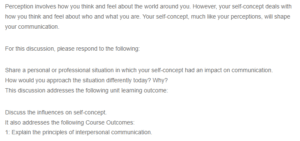Overcoming Barriers to Perception – Interpersonal Communications
According to Light (2017), self-concept is people’s image of themselves. The main parts of self-concept include the ideal self, the real self, and self-esteem (Vartanian & Hayward, 2017). The ideal self includes a person’s ambitions and vision of what they want. The real self includes how a person currently perceives and sees themselves, while self-esteem includes how much value and worth a person believes they have. During the COVID-19 pandemic, I volunteered to distribute masks to the elderly. My self-concept affected my communication with other volunteers because I viewed myself as their superior because most of them were students. Therefore, I only communicated with them by giving instructions about what should be done. I also limited constant communication with them because we did not have anything in common to talk about. My self-concept also influenced my choice of communication channels. For example, I rarely communicated with my fellow volunteers via our WhatsApp group, but instead, I used face-to-face communication or phone calls.
Self-concept can be changed by changing the characteristics used to describe a person and how one feels about their interactions with their environment. People can also develop different self-concepts by changing their passions and hobbies and adjusting how they view their personalities (Cicero, 2017). If I were in the same situation today, I would approach it differently by changing my self-concept to accommodate my fellow volunteers’ behaviors, attitudes, and personalities so that we could exchange information and ideas. I would also adjust to communicating through the WhatsApp group because it was the main communication channel that everyone was comfortable with. I would also maintain constant communication with my fellow volunteers to stay informed about what is happening around them and create social interaction.
References
Cicero, D. C. (2017). Self-concept clarity and psychopathology. Self-Concept Clarity, 219–242. https://doi.org/10.1007/978-3-319-71547-6_12
Light, A. E. (2017). Self-concept clarity, self-regulation, and psychological well-being. Self-Concept Clarity, 177–193. https://doi.org/10.1007/978-3-319-71547-6_10
Vartanian, L. R., & Hayward, L. E. (2017). Self-concept clarity and body dissatisfaction. Self-Concept Clarity, 195–218. https://doi.org/10.1007/978-3-319-71547-6_11
ORDER A PLAGIARISM-FREE PAPER HERE
We’ll write everything from scratch
Question 
Perception involves how you think and feel about the world around you. However, your self-concept deals with how you think and feel about who and what you are. Your self-concept, much like your perceptions, will shape your communication.

Overcoming Barriers to Perception
For this discussion, please respond to the following:
Share a personal or professional situation in which your self-concept had an impact on communication.
How would you approach the situation differently today? Why?
This discussion addresses the following unit learning outcome:
Discuss the influences on self-concept.
It also addresses the following Course Outcomes:
1: Explain the principles of interpersonal communication.